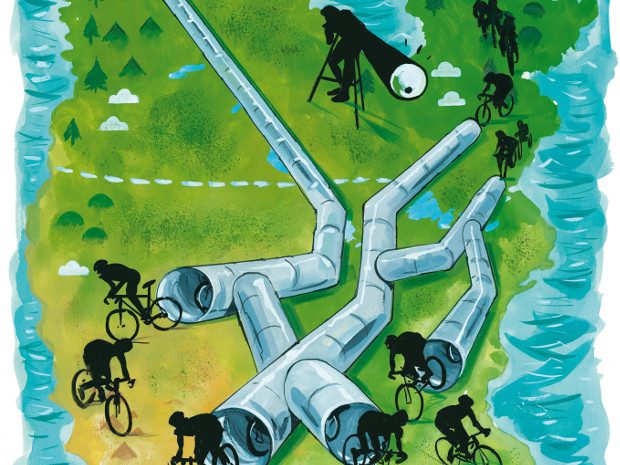The pipeline: Canadian riders on Optum presented by Kelly Benefit Strategies
When it comes to professional road cycling in the U.S., Canadians are there, at all levels. They ride, direct and manage. Yes, they’ve infiltrated, eh.


Has Canada infiltrated U.S. pro cycling? Canadian riders are mostly indistinguishable from their U.S.-born teammates. Except for the pronunciation of some words, and the occasional use of “eh,” often there isn’t much to tip off those American riders that Canadians are in their midst. And really, our U.S. cousins have nothing to worry about. Feb. 16 marked 200 years since the Treaty of Ghent was ratified by the U.S. Senate, ending the War of 1812. That’s 200 years of peace. We are their largest trading partner and we share an 8,891-km border that is undefended. But make no mistake, when it comes to professional road cycling in the U.S., Canadians are there, at all levels. They ride, direct and manage. Yes, they’ve infiltrated, eh. Below is the first of three parts looking at just where the Canucks are lurking.
In 2014, Optum presented by Kelly Benefit Strategies, a UCI continental outfit based in Minneapolis, Minn., was a team crawling with Canadians. Will Routley and Ryan Anderson were on the men’s side; on the women’s, Leah Kirchmann, Densie Ramsden, Annie Ewart and, for part of the season, Joëlle Numainville. For 2015, if you didn’t like accents that come from north of the 49th, you’d say things have gotten worse. While Ramsden has moved to B.C.’s Trek Red Truck and Numainville is with a European outfit, Optum has had an influx of Canucks for the upcoming season. Climber Lex Albrecht returns to the team after two years of racing with other squads. Olympic track medallist Jasmin Glaesser joins Albrecht on the women’s team. Guillaume Boivin, Pierrick Naud and Michael Woods are also new additions.
Optum performance director Jonas Carney has had his eye on Canada since he started putting his program together in 2007. It was a much dirtier time in cycling with a greater number of athletes doping. Carney was adamant about filling his team with riders he could vet so he could be confident that they didn’t dope. He was limited mostly to North America, where he is well connected to the scene. He knew which riders were associated with the sketchy directors and coaches. The same couldn’t be said for Europe and elsewhere. At the time, Carney was also up against teams with much bigger budgets. So, he looked north.
“Most U.S. teams seemed to be ignoring Canada and mostly hiring U.S. guys, or importing riders from Australia or South America,” said Carney. “So I really focused on Canadian athletes those first few years. I leaned on friends like Svein Tuft, Eric Wohlberg and Pierre Hutsebaut to help me identify talent and make sure that the riders we were recruiting were good guys.” With riders such as Martin Gilbert, Dominique Perras, Keven Lacombe and David Veilleux coming onto the team, Carney joked that he got his riders via “the Quebec pipeline.”
“It kind of turned into more of a Quebec-Ontario pipeline, and then a Canadian pipeline when Symmetrics folded,” Carney said of the Canadian team that was disbanded in 2008. From 2011 to the end of 2012, Carney’s line to the north was blocked. “The Canadian pipeline was sort of shut down temporarily when SpiderTech turned pro continental and increased its budget.”
Now that Canada is without a professional continental team, it seems the spigot on the pipeline is wide open. Kevin Field directed the Optum women’s team in 2014, and will focus more on sponsorship in 2015. Eric Wohlberg has been a director with Optum since 2012. Stocking your team with Canucks isn’t just about availability, however. The UCI has rules about how many non-U.S. citizens can ride on a U.S. continental team such as Optum. Albrecht fell victim to those rules in at the end of 2012. Team general manager Jacob Erker, who is from Calgary and came to Optum after Symmetrics folded, is glad Albrecht is back. “She’s certainly gotten even better than the year she was with us,” Erker said. “She almost won Philly last year and had a top-five in Gatineau.”
While Albrecht brings her skill as a climber, Erker is hoping Glaesser’s abilities as a time triallist will help the team, especially at the road world championships in Richmond, Va., in September. “We got fourth at worlds triple T in 2014. We were seven seconds off of the podium. Certainly the goal will be to try and get a medal at worlds in Richmond, “ Erker said. At least two Canadians—national time trial champion Kirchmann and Glaesser—will work to get an American team on the podium when the worlds comes to the U.S.
Michael Woods moves to Optum from the defunct 5-hour Energy presented by Kenda. He’ll be replacing Carter Jones, who left for the WorldTour team Giant-Alpecin, as the go-to climber on the men’s team. It may seem like a lot of pressure for a former runner whose first season as a pro rider was 2012, but Erker has confidence in Woods. “He was definitely the best climbing talent available on the market, bar none. He backed it up late into the season. He made the final breakaway in Quebec City, and then made the elite selection in Montreal. Those are full-on WorldTour races. The potential is there.”
